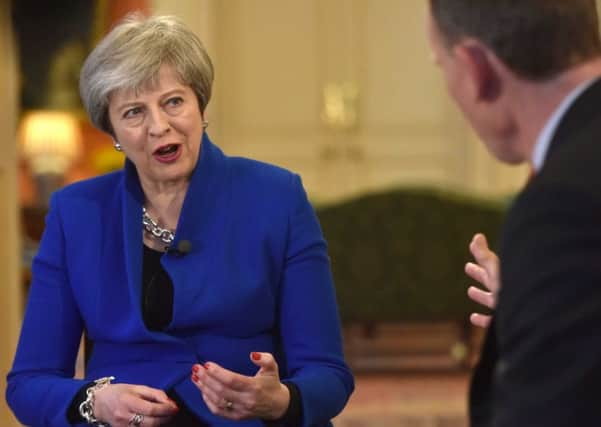Theresa May's Brexit tactics to be put to the test as negotiations resume


The Prime Minister on Friday set out her strategy for negotiations on the UK’s future relationship with the EU in a high-profile speech which earned her breathing space from warring Remain and Leave factions in the Conservative Party.
But Mrs May’s plans for maintaining a soft Irish border while leaving the customs union were thrown into doubt after Ireland’s foreign minister Simon Coveney said the EU may not accept her proposals.
Advertisement
Hide AdAdvertisement
Hide AdThe technical negotiations from Monday to Wednesday will focus on the issue alongside a proposed transition period and other withdrawal issues including the financial settlement and citizens’ rights, on which disagreements still need to be ironed out.
Amid the ongoing row over the Irish border, Sinn Fein leaders Mary Lou McDonald and Michelle O’Neill will also travel to Brussels on Monday to meet EU chief negotiator Michel Barnier.
Mrs May is hoping to get a post-Brexit transition period signed off at the European Council summit of EU leaders on March 22-23, clearing the way for exploratory talks on trade.
But tensions over the Irish border issue remain and could hold up agreement, although tripartite talks between the UK, Ireland and the European Commission have been set up to analyse options.
Mrs May has rejected Brussels proposals that would see Northern Ireland kept in an effective customs union with the EU as a fallback in case other solutions cannot be found.
She has proposed technological solutions and an exemption from new restrictions on the 80% of cross-frontier trade carried out by smaller businesses.
But on Sunday, Irish Tanaiste Mr Coveney told BBC One’s The Andrew Marr Show he was “not sure that the European Union will be able to support” the plan, as it would be worried about protecting the integrity of the single market.
“While of course we will explore and look at all of the proposed British solutions, they are essentially a starting point in negotiations as opposed to an end point,” he said.
Advertisement
Hide AdAdvertisement
Hide AdMrs May’s de facto deputy, Cabinet Office minister David Lidington, said her high-profile Friday speech was an “ambitious opening bid” and suggested the border proposals could be tweaked.
Asked if the fallback option proposed by the EU was inevitable, Mr Lidington told ITV’s Peston on Sunday: “I’m much less pessimistic than you are, clearly we are at the start of a negotiating period and will want to sit down with our EU partners and work through where their concerns, whether legal or technical, are, and see how we might together address this.”
Nigel Dodds, deputy leader of the Democratic Unionist Party which props up Mrs May’s minority Government, pressured Ireland to take her proposals seriously.
The DUP MP said: “It is in the Republic of Ireland’s economic interests to have a sensible agreement between the United Kingdom and the European Union. A no deal Brexit would be catastrophic for the Republic.
“Despite this fact, the Irish Foreign Minister Simon Coveney has thrown his weight behind Brussels. The Irish government’s current approach defies logic.”
He added: “Even Michel Barnier has recognised ‘the solution cannot be based on a precedent’.
“Rather than vent outrage about the United Kingdom’s democratic decision to leave the European Union, the Irish government should be seriously considering innovative solutions. A good deal for the United Kingdom will mean a good deal for the Republic of Ireland.”
Meanwhile Baroness Bertin, a former aide to David Cameron, said Mrs May was in touch with her predecessor before Friday’s speech.
Advertisement
Hide AdAdvertisement
Hide AdShe told Westminster Hour: “They have spoken actually and she did speak to him before this speech, so they are on pretty good terms.”
The Tory peer added: “I wasn’t sort of privy to the conversation, but yes they were in contact before the speech, a couple of days before.”
